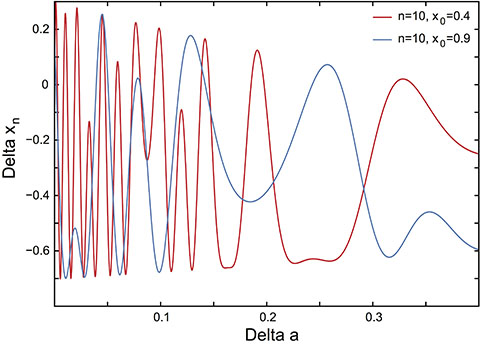Discrete Math. 324: 19-27, 2014
Abstract
One of the simplest polynomial recursions exhibiting chaotic behavior is the logistic map $$x_{n+1} = a x_n ( 1 - x_n )$$ with $x_n, a \in \mathbb{Q}: x_n \in [0,1] \ \forall n \in \mathbb{N}$ and $a \in (0,4]$, the discrete-time model of the differential growth introduced by Verhulst almost two centuries ago (Verhulst, 1838) [12]. Despite the importance of this discrete map for the field of nonlinear science, explicit solutions are known only for the special cases $a = 2$ and $a = 4$. In this article, we propose a representation of the Verhulst logistic map in terms of a finite power series in the map's growth parameter $a$ and initial value $x_0$ whose coefficients are given by the solution of a system of linear equations. Although the proposed representation cannot be viewed as a closed-form solution of the logistic map, it may help to reveal the sensitivity of the map on its initial value and, thus, could provide insights into the mathematical description of chaotic dynamics.
Supplementary Information and Material
Some thoughts about closed-form solutions and smoothness in $a$
On Mathworld it is conjectured that it may not be possible to solve the logistic recurrence in closed form [1]. However, Wolfram has also postulated that any exact solution, if it were possible, must be of the form $$ x_n = \frac{1}{2} \left\{ 1 - f \left[ a^n f^{-1} (1-2x_0) \right] \right\} $$ with $f$ being some function and $f^{-1}$ its inverse [2]. In our study, we explicitly derive an exact solution, differing in form from this postulate, in terms of a finite power expansion in the recursive map's parameter a and initial value $x_0$, valid for all $x_0, a \in \mathbb{Q}: x_0 \in [0,1]$ and $a \in (0,4]$.
The proposed explicit form also questions the conjecture that a smooth solution cannot exist for generic values of $a$, with possible exceptions of $a$ even and nonzero (M. Trott, pers. comm.; see [1]), as a finite power expansion in $a$ is, by definition, smooth in $a$. This observation can further be consolidated by a numerical evaluation of the recursive map at a given step $n$, for arbitrary $a$ and the known solution for $a=4$. Plotting the numerical difference $$ \Delta x_n (a) = \frac{1}{2} ( 1 - \cos[ 2^t \, \mbox{arcos}[ 1 - 2 x_0 ] ] ) - x_n(a) $$ between both mappings as a function of $a$ reveals a non-trivial but clearly smooth change with $a$ if the precision is chosen sufficiently (see Fig. 1; Mathematica code snippet can be found below).
 |
Figure 1: Difference $\Delta x_n (a)$ between the solution of the logistic map for $a=4$ and the recursive (numerical) solution $x_n(a)$ at arbitrary $a$ for a fixed step $n=10$ and two different initial values $x_0$ as function of $\Delta a = 4-a$. |
References
| [1] | Weisstein, Eric W. "Logistic Map." From MathWorld-A Wolfram Web Resource. http://mathworld.wolfram.com/LogisticMap.html. |
| [2] | Wolfram, S. |
Mathematica
A simple Mathematica code snippet defining the logistic map can be found here. It defines the following functions and procedures:
| LogisticMap[ x , a ] | defines the logistic map with parameter $a$ | |
| LogisticMapT[ x0 , a , max ] | returns a list of map values up to step max | |
| f[ t , x0 ] | defines the exact solution for $a=4$ |
The code generates a list diff containing $\Delta x_n (a)$ up to step nmax, and writes the result to a file named "Results.dat"
